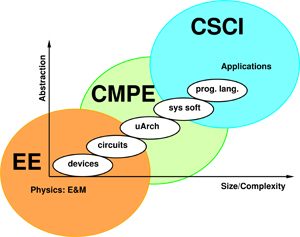Why Pursue a BSE in Computer Engineering?
 The Penn Computer Engineering (CMPE) major emphasizes design and engineering. As a result, the Computer Engineering major includes a steady stream of hands-on projects where students build, measure, and test hardware and software systems.
The Penn Computer Engineering (CMPE) major emphasizes design and engineering. As a result, the Computer Engineering major includes a steady stream of hands-on projects where students build, measure, and test hardware and software systems.
Computer engineering emphasizes both an understanding of physical costs and complexity management of large systems. Computer Engineers are the engineers who can identify the necessary physical costs associated with performing powerful, high-level computational tasks.
Computer Engineering trades off some of the depth in mathematical foundations which exists in both Electrical Engineering (EE) and Computer Science (CSCI) such as signal processing, feedback and control, linear systems, learning, and computability in order to promote experiences which connect real system design tradeoffs to mathematical guidance.
Computer Engineering , Electrical Engineering, or Computer and Information Science – Which is Best for Me?
Computer Engineering is a natural path for students interested in embedded and real-time systems, consumer electronics, or computer system design (including architecture, operating systems, distributed systems, compilation and electronic design automation).
Computer Engineering is also a good path for students interested in security, networking, and robotics, though these fields are broad enough that, depending on specific interests, Electrical Engineering or Computer Science might also be good paths. For example, within robotics, strong interests in controls or sensing might be best served in Electrical Engineering, while strong interest in planning and world modeling might be best addressed with a Computer Science focus. If your passion lies in devices, analog circuits, control theory, or signal processing, then Electrical Engineering is a more appropriate major. If your passion lies in computational theory, programming languages, learning, vision, databases, linguistics, bioinformatics, or social networking, then Computer Science is a more appropriate focus.
Download the full program description and guidelines for students considering the CMPE major
Computer Engineering Role Models
As one way to characterize where you might go as a Computer Engineer, we have identified a set of role models* that exemplify the impact of computer engineers in our modern world.
- J. Presper Eckert and John Mauchly — Developed ENIAC, the first general-purpose digital computer at Penn and went on to found the first commercial computer company.
- Admiral Grace Murray Hopper — Developed the first compiler for a computer programming language. Hopper was also a lecturer at Penn.
- Fred Brooks — led development and management of IBM System/360 and OS/360, one of the first computer architectures where software could move seamlessly across different computer hardware with a range of performance, cost, and technology points.
- Seymour Cray — father of supercomputing; founded Cray Research and led the development of vector computers that were the fastest in the world in their time.
- Bob Metcalfe — inventor of Ethernet and founder of 3COM.
- Bob Colwell — led the development of superscalar Pentiums at Intel.
- Steve Jobs — cofounder of Apple and led the development of usable consumer electronics.
*Except as specifically noted, these particular individuals are not associated with Penn.
Meet the Students of CMPE!
PennHacks and Computer Engineering at Penn
Uploaded by School of Engineering and Applied Science on 2014-02-12.
You can also browse the profiles for several of our students here.
